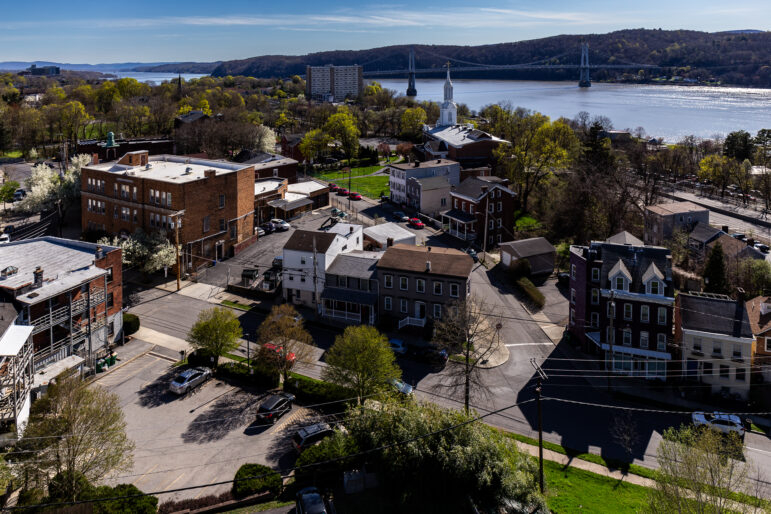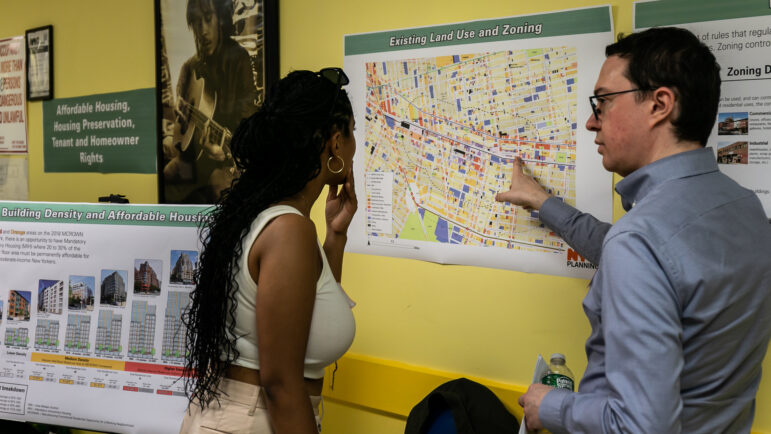‘When Brooklyn Borough President and likely next New York mayor Eric Adams declared that under his watch, “New York will no longer be anti-business” one could wonder what city he’s been living in.’

Ed Reed/Mayoral Photography Office
Mayor Bill de Blasio and city officials in 2018, announcing Amazon’s plans to build headquarters in Queens. The deal later fell through.When Brooklyn Borough President and likely next New York mayor Eric Adams declared that under his watch, “New York will no longer be anti-business” one could wonder what city he’s been living in. While New York City is certainly an expensive place to do business, with high taxes compared with most other U.S. cities, calling it anti-business is a stretch. Since its controversial days as a trading outpost under the Dutch East India Company, New York has always been about business. Especially big business.
The mores and manners of business run deep within the city’s civic culture, influencing everything from our art to our politics, our schools to our streetscapes. Though computer screens now replace smokestacks as the engine of commerce, New York still remains the kind of city of ambition pictured by Alfred Stieglitz in 1910. CEOs, financiers and developers are our royalty.
READ MORE: Dem Mayoral Nominee Eric Adams Promises To Change NYC’s ‘Anti-Business’ Reputation
Maybe New York’s current Mayor Bill de Blasio has shied away from hobnobbing with the city’s corporate elite. Until recently he was a no-show at the $35,000-a-ticket Met Ball, and freely admitted through the first years of his mayoralty he’d never set foot on the High Line, a magnet for corporate donations and a symbol of the Bloomberg era’s remaking of the Far West Side for high-income residents and tourists. While Michael Bloomberg may have embraced his fellow corporate leaders, de Blasio’s personal discomfort didn’t translate into an ideological shift.
 CityViews are readers’ opinions, not those of City Limits. Add your voice today!
CityViews are readers’ opinions, not those of City Limits. Add your voice today!
“After forty years that favored wealth and business,” writes Thomas Dyja in New York, New York, New York, “most New Yorkers were ready for a City Hall that took them into account again when making decisions… But de Blasio had political debts to pay after his election and his anti-Establishment distrust of his own office didn’t create Power to the People as much as it repoliticized City government.”
Amazon’s aborted plan to establish a huge campus in Long Island City serves as the poster-child for the-City-Hall-hates-business refrain. Yet the de Blasio administration was only all too happy to play Amazon’s game, joining with dozens of other cities and parading our municipal assets like eager-to-please contestants in a beauty pageant. The city won, and de Blasio exalted. But when some other local elected officials and community organizations complained, especially about the hefty tax breaks Amazon would enjoy, our beauty crown became tarnished and Amazon went elsewhere.
READ MORE: When the Applause and Anger Over Amazon’s Withdrawal Fade, There Will be Work to Do
Or did they? Since then, with far less splash, Amazon has been expanding its corporate footprint in the city. Less than a year after it backed out of Long Island City, Amazon bought the old Lord & Taylor building for $1.5 billion. It also leased more than 330,000 square feet of office space in Hudson Yards and a 312,000-square-foot industrial space in Red Hook.
Just a week after Adams’ declaration of change is coming, Google announced it was plunking down $2.1 billion to buy a building in Hudson Square. That’s in addition to the $1.8 billion it spent in 2010 on a building in Chelsea.
Other big firms, especially in the tech world, have also been expanding in the city. Facebook, for example, has taken 2.2 million square feet of office space in the city in recent years, according to the New York Times. New York’s allure to business, particularly Silicon Valley tech firms, was noted in March by Forbes magazine: “Part of this is a larger wave of corporate relocations out of California to more business-friendly environments.”
Some of this friendliness can take fairly prosaic form. The city has two special programs that give delivery and service companies, big and small, a break on the thousands of parking tickets they amass each year. The 10 most heavily fined firms—ranging from UPS to Verizon to Manhattan Beer Distributor—saved an estimated $20.4 million in fiscal year 2018 on their parking fines based on pre-determined fine amounts, according to a report by the city’s Independent Budget Office (full disclosure: I worked at IBO and helped edit the report at the time it was published).
The biggest aid comes in the form of tax breaks. The city’s industrial and commercial incentive and abatement programs provided firms with more than $850 million in tax breaks in city fiscal year 2021. Bank of America Tower benefitted from $82 million in property tax savings in fiscal year 2021; Goldman Sachs had savings of $45 million at two sites and Madison Square Garden nearly $44 million. Breaks on taxes for investment capital, insurance companies and through other income tax-cutting programs amounted to $1.9 billion in savings for businesses in fiscal year 2021.
Interestingly, Google reportedly is not intending to claim the automatic tax breaks it could get at the site it’s purchasing. This may say something about Google’s extreme wealth. It also may reflect the appeal the city has on other levels. “New York’s energy, creativity and world-class talent are what keep us rooted here…,” said Google’s chief financial officer when the deal was announced in September.
There’s no doubt the city can be a tough place to run a business, especially a small business. There are many regulatory hoops to jump through and fees to pay. And rents can be punishing, as evidenced by the large number of vacant storefronts in some parts of the city even before the COVID-19 pandemic.
Some of the city’s business leaders probably chafed at Mayor de Blasio’s embrace of the “fight for $15,” recognizing it would put pressure on wages well beyond the lowest end of the pay scale. Nor were some enamored of his successful push to require most businesses to provide paid sick days for staff, or his expansion of the Department of Consumer Affairs to investigate wage theft and other workplace abuses.
Yet none of these changes fundamentally altered the city’s approach to business attraction and retention. Or the dominance of the voice (if not the presence) of certain segments of the business community in City Hall’s decision-making. Take for example the Mayor’s demand that about 80,000 municipal workers who had been working remotely during the pandemic return full-time to their offices last month. Commercial property owners were worried about rising vacancy rates as remote work became a norm for many desk-bound workers. With municipal employees back at their offices, the mayor was sending a broader signal that it was time for everyone to get back to the office—choosing to endure the wrath of city workers over triggering the ire of real estate honchos.
Is it really anti-business to not want sick restaurant staff to have no choice but to come to work and serve you food? Or is it just good public health sense—and maybe even pro-business in the long run because customers feel safer? Besides changes such as this, much of the supposed anti-business sentiment coming from City Hall really has more to do with optics than policy shifts.
The important question, though, isn’t whether or not it’s fair to label City Hall as anti-business for the past eight years, but who its economic development policies benefited. As Zephyr Teachout recently wrote in the Times-Union: “We have two big changes to make: first, to switch from a vision of giving money to private few to making public investments—with an emphasis on the public. Public banks, public schools and public broadband. Second, we’ve got to stop seeing big, already powerful businesses as the drivers of growth.”
Teachout was writing about the state, but the same could easily apply to the city. Business leaders may not have had a prime seat at the policymaking table under de Blasio as they did with Bloomberg (and other mayors before him), but the city’s fundamental approach hasn’t changed all that much. Teachout’s prescription would alter that dynamic, steering economic development initiatives towards the broader public good. Of course, those who most profit from the current approach would likely call such changes anti-business.
Doug Turetsky, a former City Limits reporter and editor, was most recently chief of staff and communications director at the New York City Independent Budget Office.









3 thoughts on “Opinion: Is New York City Really Anti-Business?”
Try getting a certificate of occupancy and or building plans approved and signed off or relief from the BSA, or paying Taxes on Commercial Property
I’m sure City doesn’t want to be Anti Business business ie Real Estate is one of their cash cows I’m sure they want business to prosper I think what The issue is how do you make the nyc. user friendly for everybody business’s and citizens. Yeah google can throw money at high taxes, fines and pay for an army of consultants and Expediter’s It’s just not that easy foe small businesses or smaller business and regular folk to blow off the resistance and friction of doing their business w and in this city
Talk to anyone that owns a restaurant in NYC and they will tell you how anti-business NYC has become under the useless deBlasio. Endless fines, inspections and now forcing employees, some of whom are teenagers, to enforce a vaccine mandate of dubious legality.
This is a silly take. These companies are buying property in New York because it is a long-term revenue generator for them. They have cash right now and the value of buildings in NYC are going to skyrocket over the next 20 years because of the anti-development sentiment in the city. The $1 billion building that Amazon is buying now will be worth $2 billion in 10 years. They aren’t growing their footprint in NYC, they are gobbling up investment properties and staffing workers here because they are growing their company everywhere. Also, they don’t have to pay basically any federal taxes when they reinvest money into real estate. So a $1 billion purchase is basically a massive tax break. Amazon’s success pushes out small businesses. Only way to prevent that would be to build more housing here to accommodate population growth and prevent low-income people from being pushed out of the city, but building housing is impossible in this city. The idea that government bureaucracy limiting growth is in anyway pro-business is laughable. NYC isn’t pro-business, it is a depot for the wealthy. It is a place for the richest people and corporations in the country to safely store their wealth and reduce their risk.